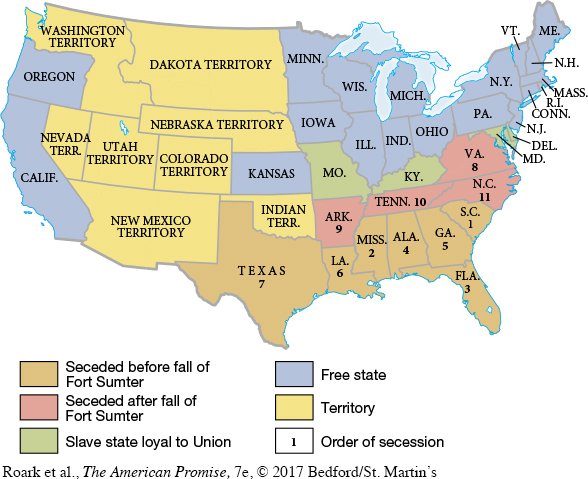The American Promise: Printed Page 408
The American Promise, Value Edition: Printed Page 373
The American Promise: A Concise History: Printed Page 425
The Upper South Chooses Sides
The Upper South faced a horrendous choice: either to fight against the Lower South or to fight against the Union. Many who only months earlier had rejected secession now embraced the Confederacy. To vote against southern independence was one thing, to fight fellow Southerners quite another. Thousands felt betrayed, believing that Lincoln had promised to achieve a peaceful reunion by waiting patiently for Unionists to retake power in the seceding states. It was a “politician’s war,” one man declared, but he conceded that “this is no time now to discuss the causes, but it is the duty of all who regard Southern institutions of value to side with the South, make common cause with the Confederate States and sink or swim with them.”
Virginia, Arkansas, Tennessee, and North Carolina joined the Confederacy (Map 15.1). But in the border states of Delaware, Maryland, Kentucky, and Missouri, Unionism triumphed. Only in Delaware, where slaves accounted for less than 2 percent of the population, was the victory easy. In Maryland, Unionism needed a helping hand. Lincoln suspended the writ of habeas corpus, essentially setting aside constitutional guarantees that protect citizens from arbitrary arrest and detention, and he ordered U.S. troops into Baltimore. Maryland’s legislature rejected secession.

The struggle turned violent in the West. In Missouri, Unionists won a narrow victory, but southern-
Lincoln understood that the border states—
The American Promise: Printed Page 408
The American Promise, Value Edition: Printed Page 373
The American Promise: A Concise History: Printed Page 425
Page 409In the end, only eleven of the fifteen slave states joined the Confederate States of America. Moreover, the four seceding Upper South states contained significant numbers of people who felt little affection for the Confederacy. Dissatisfaction was so rife in the western counties of Virginia that in 1863 citizens there voted to create the separate state of West Virginia, loyal to the Union. Still, the acquisition of four new states greatly strengthened the Confederacy’s drive for national independence.
REVIEW Why did the attack on Fort Sumter force the Upper South to choose sides?